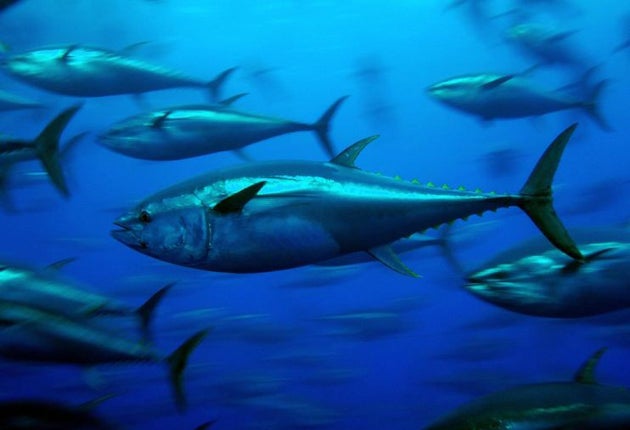World fish stocks in ‘dire state’ with nearly one in 10 close to collapse, study finds
An assessment of fisheries in 142 countries finds that almost every nation is failing to meet sustainability targets, writes Peter Stubley

Half of the world’s assessed fish stocks have been depleted below sustainable levels and nearly a tenth are close to collapse, according to a new study which suggests they are in a much worse state than previously thought.
The first edition of the Global Fishing Index warns that almost every country is failing to deliver on global commitments to prevent the destruction of the ocean and the livelihoods of coastal communities.
It calls on governments and businesses to set “strong, time-bound and measurable targets to restore fish stocks”, while noting that it could take up to 30 years for them to recover.
The report, which will be updated every three years, was published by the Minderoo Foundation, an independent philanthropic organisation backed by Australian billionaire Andrew Forrest.
Mr Forrest said he was “deeply saddened” by the findings and added: “The world’s fish stocks are in a dire state, far worse than previously thought.
“The reality is that countries continue to target already-overfished stocks, and blindly exploit stocks they know next to nothing about.
“Governments around the world have not only missed the target, the problem is getting worse.”
The report, which claims to be the largest assessment of fish stocks to date, grades 142 countries on a scale of A to F based on how far they have progressed towards restoring fish stocks to sustainable levels.
No countries were graded A or B and only six – Chile, Iceland, Ireland, Latvia, Norway and the United States of America – achieve a C grade “pass” with a progress score of at least 40 out of 100.
The UK was graded D, with a progress score of 35.6. The report found that 72 per cent of the UK’s catch was assessed, and 49 per cent of assessed stocks are within sustainable levels.
Noting that the UK has “a well-developed fisheries governance system”, the report found that “it has made limited progress to restore fish stocks to sustainable levels, with half of its assessed stocks being classified as overfished”.
One of the report’s key findings is that more than half (52 per cent) of the global catch since 1990 has come from stocks that lack sufficient data to estimate whether they are sustainable or not.
In 89 countries, over half of fish comes from unassessed stocks and in 29 countries 100 per cent of coastal fish stocks are unassessed.
This lack of data means that the problem could be even worse than the report suggests.
The assessment of 1,465 stocks found that 49 per cent are overfished, meaning they have been reduced to below 40 per cent of the level that can produce “maximum sustainable yield” and can therefore be fished indefinitely.
Previous estimates, based on a smaller sample, had suggested that 34 per cent of fishing stocks were overfished.
The report also makes three key recommendations:
- Set ambitious targets to restore fish stocks and improve management
- Establish and expand data collection programmes and publish the data
- Adopt evidence-based management strategies such as catch limits in all fisheries
Peter Thomson, the UN secretary general’s special envoy for the ocean, said the index “shines a bright light on the scourge of overfishing”.
“It challenges all of us to up our game,” he added. “It is a call to action to all countries to tighten controls and eliminate the drivers of overfishing once and for all, so that we can ensure a healthy, bountiful ocean for future generations.”
Join our commenting forum
Join thought-provoking conversations, follow other Independent readers and see their replies
Comments


Bookmark popover
Removed from bookmarks